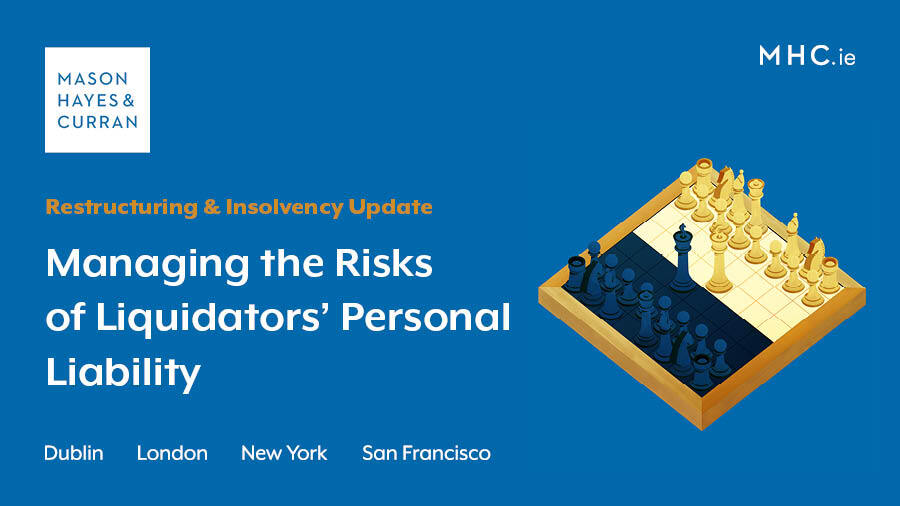

A recent High Court case highlighted the issue of the personal liability of liquidators where they take proceedings in their personal capacity, as opposed to causing the company in liquidation to. James Morrin, Restructuring & Insolvency Partner, reviews the decision and the practical implications for the law in this area.
There are certain circumstances where liquidators can be held personally liable for costs orders made in proceedings taken by them.
Under the so called “Ballyrider Principles[1]”:
Where a liquidator is personally liable for costs and has recourse to the assets of the company to meet such costs, if those assets are insufficient to meet the costs the liquidator will be personally liable for any shortfall.
The law in this area has recently been subject to scrutiny by the High Court in Ballylea Developments LTD (In Voluntary Liquidation) v Companies Act 2014[3].
In that case, the liquidator of two companies issued proceedings in his own name alleging that there had been an improper transfer of assets out of the two companies.
The defendants sought confirmation from the liquidator that he would accept personal liability for any adverse costs orders made in the proceedings, in circumstances where the companies in liquidation had insufficient assets to meet any such orders.
The liquidator refused to provide this confirmation, and the defendants issued a motion seeking a declaration from the Court that the liquidator would be personally liable to them for any adverse costs.
The liquidator denied that he should be held personally liable if an adverse costs order was made, principally based on an argument that such an order would be premature and would amount to an undue interference with the trial judge’s ultimate discretion to award costs. The Court dismissed this argument, as even if an adverse costs order had to be imposed against the liquidator, the trial judge still had discretion to decide if adverse costs should be awarded at all.
Certain causes of action that arise for liquidators under the Companies Act 2014 can only be brought by liquidators in their personal capacity. Some examples of these include applications under sections 608, 609 and 612 of the Companies Act 2014 which relate to the:
While a liquidator can usually look to the assets of the company to pay the costs including adverse costs of such proceedings, there is always a risk of personal exposure.
The practical implication of this is that liquidators may justifiably be reluctant to issue proceedings where they and their personal assets are potentially exposed in the event of an adverse costs order. Indeed, the Court in Ballylea marked its concern in relation to “any possible chilling effect” and “any impediment to liquidators in carrying out their role, particularly in pursuing any asset which may have been transferred from the company” in making the declaration as sought. However, the Court held that making the declaration would simply reflect the existing law on this point.
One measure that could possibly give liquidators comfort would be the introduction of legislation permitting third party funding of insolvency practitioners, which could feasibly mitigate the risk in this regard in circumstances where funders will typically indemnify a liquidator for any adverse costs. While still not permitted in Ireland, the introduction of legislation to allow third party funding for insolvency practitioners has been recommended by the Company Law Reform Group[4] and was considered by the Law Reform Commission in its recently published Consultation Paper on Third Party Funding[5].
For more information on the personal liability of liquidators, contact a member of our Restructuring & Insolvency team.
The content of this article is provided for information purposes only and does not constitute legal or other advice.
[1] See Re Ballyrider, Unreported, 31 July 2019
[2] Note that costs in such circumstances will be classed as a costs and expense of the winging up and therefore rank ahead of the liquidator’s own remuneration – see Eteams International v Bank of Ireland [2020] IESC23 at [17] – [18].
[4] Company Law Review Group, Report on the Consequences of Certain Corporate Liquidations and Restructuring Practices, Including Splitting of Corporate Operations from Asset Holding Entities in Group Structures (Company Law Review Group 2021) at page 41.
[5] Law Reform Commission, Third-Party Litigation Funding (LRC CP 69 – 2023).